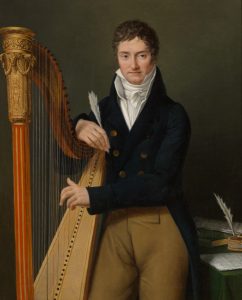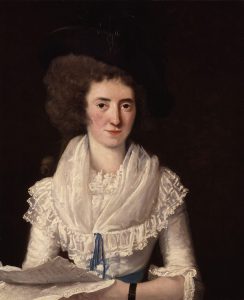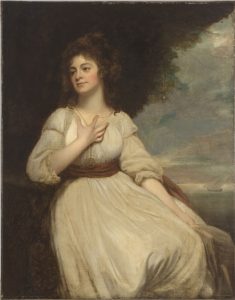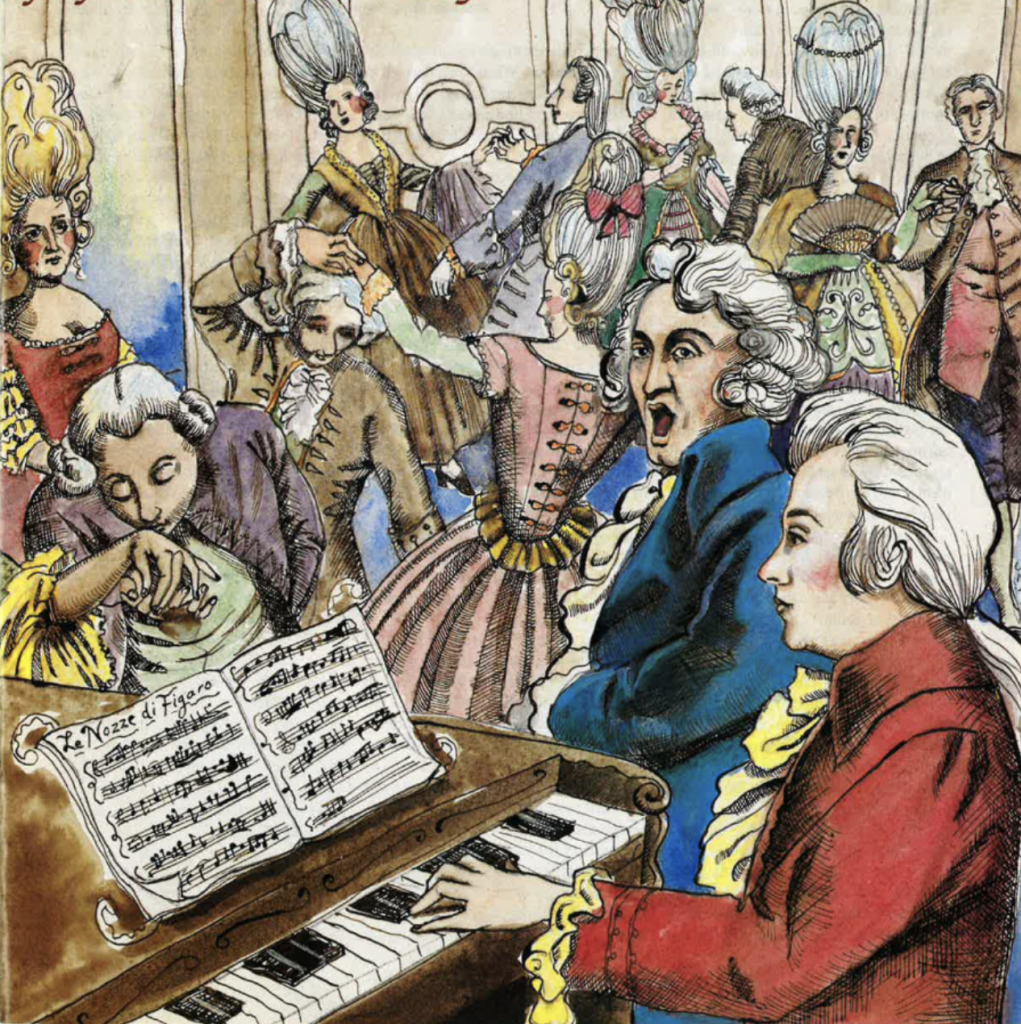Isabelle Emerson writes on the fascinating life of Irish tenor Michael Kelly.
Michael Kelly’s career started early: at the age of three he was served up on the table with the wine to sing for the entertainment of his father’s guests. His powerful soprano was, perhaps surprisingly, not damaged by this unusual stage or by the succession of rather peculiar voice teachers, domestic and foreign – including one Morland who liked to instruct young Michael around 1:00 A.M.
The boy worked hard, inspired, he wrote, by the example of another teacher, Signor St. Georgio: “Once I saw Signor St. Georgio enter a fruit shop; he proceeded to eat peaches and nectarines, and at last took a pineapple… while my mouth watered I asked myself why, if I assiduously studied music, I should not be able to earn money enough to lounge about in fruit shops, and eat peaches and pineapples as well as Signor St. Georgio.”
At the age of 15 or 16 (he was never quite sure of the year of his birth), Michael made his debut in his native Dublin, replacing on short notice the castrato in Piccini’s La Buona Figiola. His powerful treble (fortunately still unchanged) and his knowledge of Italian (all those itinerant singing masters) stood him in good stead. He received great applause, and as he wrote “acquitted myself beyond the most sanguine expectations of my friends.” With the resultant money in his pocket and with this professional experience under his belt he sailed on May 1, 1779 for Italy to study singing.

In Naples he found a powerful protector in Sir William Hamilton who advised him sagely on the virtues of timeliness: “My good boy, you were to have been here at eight; it is now three-quarters of an hour past: if you do not learn to keep time, you will never be a good musician.” Kelly made rapid progress in his lessons at the Conservatory, his recently gained professional status was respected, and he soon found himself with many professional engagements. Studies concluded, he set off for Florence by boat.
As he debarked at Leghorn, in his Sicilian cape with his long flowing hair, he was observed by a young woman who remarked to her companion in English: “Look at that girl dressed in boy’s clothes!”
Kelly replied: “You are mistaken, miss; I am a very proper he-animal, and quite at your service.” At which all three laughed, and so began a
life-long friendship between Kelly and the Storace brother and sister- Stephen and Nancy, then about seventeen and fourteen, he beginning a distinguished career as composer, she already a celebrated singer. The three traveled through Italy, performing singly and together.
Arriving in Venice they were sought out by the Viennese ambassador and offered positions in Emperor Franz Josef’s Italian opera company. Thus the three young English-speaking musicians came into the life of the Austrian capital and were in the enviable and significant position of participating in one of the great musical events of the 18th century-the premiere of Le Nozze di Figaro. Mozart’s greatest opera was first performed with an Irish Basilio/Curzio and an English Susanna- Michael Kelly and Nancy Storace.
Nearly 40 years later Kelly committed to paper his experiences in Vienna (and elsewhere), when an enterprising publisher, Henry Colburn, persuaded him to write his memoirs with the help of writer Theodore Hook.
No less a critic than Sir Walter Scott wrote of his delight in Reminiscences of Michael Kelly, “this singular compound of genius and carelessness” who had “spent all his life among the lovers of laugh and fun, choice spirits, whom Time cannot exhaust. .. and [who] are merry in spite of misfortune and grey hairs…. We have a special relish for the souffle of Seignior [sic] Kelly…. He has seen the world on both sides, and has told the result of his observation with a good deal of light humour.”
Kelly first met Mozart at a musical evening in Vienna, in 1783 or 1784. He marveled at the composer’s playing, at “[h]is feeling, the rapidity of his fingers, the great execution and strength of his left hand particularly, and the apparent inspiration of his modulations.” The “careless genius” and Mozart, the “lover of laugh and fun,” the pun-loving jokester, seem to have hit it off instantly. The evening was that Viennese favorite, serious music-making followed by a great deal of good food and drink and casual music mixed with other entertainment including dancing, in which Mozart joined eagerly. As they sat at supper, Constanze Mozart confided that her husband “was an enthusiast in dancing and often said that his taste lay in that art rather than in music.”

Kelly describes Mozart as “a remarkably small man, very thin and pale, with a profusion of fine, fair hair, of which he was rather vain,” and declares that he was “passionately fond” of his wife. The singer became a frequent visitor to the Mozart household; he attests to the composer’s predilection for punch (“remarkably fond” of it) and billiards, and tells of singing duets with Mozart as well as taking to him his own tunes.
Kelly takes us into the first full rehearsal of Figaro and we see the punch-drinking, billiard-playing, merry dance enthusiast at work. We experience the success of Figaro’s “Non più andrai” which ends the first act – we see Mozart on stage beating time in his “crimson pelisse and gold-laced cocked hat” and repeating over and over “Bravo! Bravo! Bennuci!” and the violinists beating their bows on their stands in applause.
Kelly tells how he insisted that as the judge, Don Curzio, he be permitted to stutter in the sextet as well as in the recitatives, how Mozart gave in (amazing- in view of Mozart’s hard-nosed attitude toward performances of his ensembles), and how it… worked! to the delight of all.
He wrote of the intrigues of Franz Josef’s court and Viennese life, with telling portraits of his colleagues-singers, composers, actors and it is Kelly we have to thank for the lively portrayals of the dancing craze in Vienna. Nothing interfered with enjoyment of this amusement-even ladies “in the family way” were to be seen waltzing up to the very last possible moment- apartments were set aside for the acouchement if they miscalculated the onset of that very last moment.
As a member of the Italian opera company Kelly worked under the Maestro di Cappella, Antonio Salicri, “a little man, with an expressive countenance, [whose] eyes were full of genius” but also “a clever shrewd man, possessed of what Bacon called, crooked wisdom.” He learned the role of Pylades in Gluck’s Iphigenia in Tauride with the composer, Gluck showed Kelly an enormous portrait of Handel in his bedroom, saying “I will introduce you to one whom all my life I have made my study, and endeavoured to imitate… the inspired master of our art.”
Kelly, as a musician at the court of Franz Josef, enjoyed an extremely good salary that included an apartment consisting of “an excellent first and second floor, elegantly furnished, in the most delightful part of Vienna,” fuel, four wax candles per day, plus a carriage to take him to rehearsals and performances. When Kelly decided to leave Vienna to seek his fortune in London, the Emperor gave him a year’s salary and promised re-employment if he returned at the end of the year.
Today, Michael Kelly is known primarily for his association with Mozart. But this famous connection has overshadowed his role in the English-speaking theatre world. Throughout most of Kelly’s life (he died at the age of 64), he was active as singer, director, manager, and composer. He worked with many of the great musical and theatrical figures of his day, including his old friends Nancy and Stephen Storace.
Fascinating as are his tales about Mozart, they are equalled by his descriptions of the musical and theatrical life and personalities of London and of Dublin, by his tales of provincial tours, by the accounts of his long years of working as vocalist, director of music, and composer with playwright Richard Sheridan (The School for Scandal) at the Drury Lane Theatre, and as stage manager, acting manager, and director of music at the Opera House.
He and Nancy Storace introduced to London the Viennese practice of moving about while singing ensembles (the English stood stockstill in a straight line). He often had to provide music for productions; his gifts as melodist stood him in good stead, though he seems to have hired arrangers to supply the underpinnings. Between 1789 and 1820 he furnished the music for sixty-two productions, in addition to composing a number of individual songs in English, French, and Italian (unfortunately many of his manuscripts were destroyed in the 1809 Drury Lane fire). On occasion he used music of other composers (but unlike Handel he always specified the source). Referring to this
borrowing and also to his delight in good wines, Sheridan gave Kelly the title of Composer of Wine and Importer of Music.

Reviews of his performances were mixed: one connoisseur judged him a “good musician and not a bad singer” but said he was never liked at the Drury Lane because of his “English vulgarity of manner.” Another wrote: “His voice had amazing power and steadiness, his compass was extraordinary. In vigorous passages he never cheated the ear with the feeble wailings of falsetto, but sprung [sic] upon the ascending fifth with a sustaining energy that often electrified the audience.” He seems actually to have been the first tenor to take high notes full voice instead of in falsetto.
Kelly, whose heart remained untouched during all those years in Italy and Vienna, fell deeply in love almost immediately after arriving in London in 1787 with Mrs. Anna Maria Phillips Crouch, a skilled actress and singer. He joined her and her notoriously unfaithful husband in a ménage à trois, from which Mr. Crouch departed in 1791. The two remained together until Mrs. Crouch’s death in 1805, their non-marital bliss interrupted only briefly when the extraordinarily beautiful Crouch had the good (or bad?) fortune to catch the eye of the Prince of Wales (George IV). Although in her last years Mrs. Crouch became addicted to alcohol in a very unsavory manner, Kelly stood by her to the end and would surely have married her if she had not predeceased her husband.
Brilliant, gifted, quick-witted, Michael Kelly was one of those lesser geniuses whose story illuminates the details of everyday life in his world. For Mozart, for Emperor Franz Josef, Kelly was the quintessential Irishman; with his humor, his friendliness, his love of fun, his easy tolerance of jokes and difficulties, he was certainly a felicitous representative of his native land.
Editor’s Note: This article was originally published in the July/August 1995 issue of Irish America. ♦


Leave a Reply